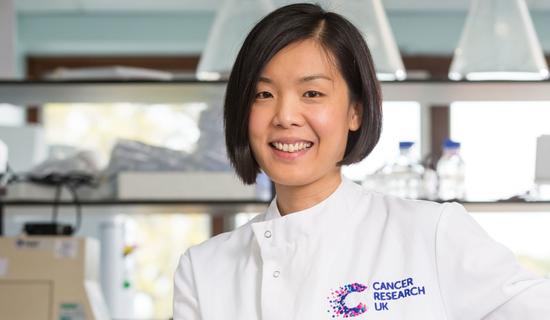Tackling treatment resistance in lymphoma

Dr Sean Hua Lim.
Dr Sean Lim is a medical doctor and a research scientist working at the Cancer Research UK Southampton Centre and specialising in lymphoma research.
Lymphoma is a cancer that begins in the infection-fighting white blood cells of the immune system, called lymphocytes.
Immunotherapies, which boost the body’s immune system to help it fight cancer, can be very effective for people with lymphoma. One way to treat the disease is with an immunotherapy drug called rituximab, which hunts down cancerous lymphoma cells and sticks to their surface, marking them for destruction by the immune system. But over time, the lymphoma cells learn how to remove rituximab from their surface, destroying it in the process. This means the cancer continues to survive in the body, undetected by the immune system, and some people’s cancer becomes resistant to treatment.
Dr Lim’s research has identified that a combination of rituximab and another drug – varlilumab – may be able to counteract this treatment resistance and could dramatically improve survival for people with the disease.
As a direct result of this work, this immunotherapy combination has been rapidly moved into a clinical trial called RiVa, led from the Southampton Clinical Trials Unit. The researchers leading RiVa hope to recruit around 40 people from four hospitals, including Southampton General Hospital, to test this combination as a new treatment option for people with non-Hodgkin lymphoma. If successful, this new treatment could soon be available to all non-Hodgkin lymphoma patients on the NHS, offering new hope to the thousands of people diagnosed with this disease every year.
In addition to her clinical trial work, Dr Lim was awarded a prestigious Cancer Research UK fellowship to continue her research in the field of immunotherapy. Dr Lim is particularly interested in the use of immunomodulatory antibodies to tackle cancer. Antibodies are specialised proteins in the blood that recognise foreign substances, such as bacteria and viruses, and then encourage the immune system to attack them. Researchers can modify antibodies in the lab to specifically target cancer cells, so they are destroyed by the immune system. This type of treatment has enormous potential – it offers a much more effective, potentially curative treatment with fewer side effects than chemotherapy.
A major goal of this fellowship is to extend the current work from liquid tumours – cancers of the blood – to solid tumours. Importantly, lymphoma can form solid tumours, as well as being present in the blood, meaning that this research could dramatically improve survival for this disease. With a wealth of clinical and scientific experience, and based in the immunotherapy hub of Southampton, Dr Lim is in a fantastic position to undertake exciting new research and advance the development of new lymphoma treatments.
